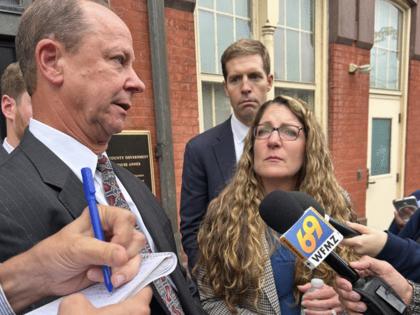Biden signs first federal anti-hazing bill into law following effort by families of victims
Published in News & Features
PHILADELPHIA — President Joe Biden signed a bill this week aimed at preventing hazing on college campuses and building transparency around hazing incidents — the first federal law of its kind.
Though most states have enacted laws aimed at curbing hazing with tougher penalties or some sort of public reporting system, the rules are uneven. Parents who have lost children to hazing, including some local families, have long called for federal lawmakers to close gaps in the patchwork system.
“No parent should have to bury their child, especially not for something preventable like a hazing death, and this bill will save lives and make a real difference in the fight against hazing,” Julie and Gary DeVercelly, a California couple who lost their son in a 2007 fraternity hazing incident at Rider University in New Jersey, said in a statement this week.
The Stop Campus Hazing Act defines hazing as any “intentional, knowing, or reckless act” committed against a student in connection with the initiation or maintenance of membership to an organization and causes “physical injury, mental harm, or degradation.” It doesn’t matter if the student is a willing participant, and the measure extends outside Greek life. Any athletic team or club that is in an institution of higher education that participates in federal student aid programs is subject to the new law.
The legislation requires colleges to offer research-based prevention and awareness training. After the Monday signing, schools will also now be required to publicly report these hazing incidents and publish the results from subsequent investigations.
The DeVercellys’ son Gary Jr. died after an event where he and his sponsoring “big brother” in the fraternity needed to finish a bottle of vodka. Because the sponsor had an exam the next day, DeVercelly drank most of the bottle before passing out, according to his father. Concerned students who wanted to call for help were told not to, DeVercelly’s father said. DeVercelly died of alcohol poisoning the next day.
High-profile hazing deaths such as DeVercelly’s have put a spotlight on the practice and expanded the scope of campus safety conversations. Because there has been no mandatory centralized system for reporting these incidents, the exact breadth of the problem is unclear. The most frequently quoted statistics on the issue come from a 2008 national study. According to that study, 55% of college students participating in groups experienced hazing.
Much of the work to spread awareness has fallen on parents like the DeVercellys and Jim and Evelyn Piazza.
The Piazzas’ son Tim was a sophomore pledging Beta Theta Pi at Pennsylvania State University in 2017 when a series of drinking challenges orchestrated by fraternity members went awry. After the mechanical engineering major passed through “the gauntlet,” he fell down stairs and suffered a collapsed lung, ruptured spleen, and a “non-recoverable” traumatic brain injury. Almost 12 hours passed before anyone called for help.
The Piazzas, of Spring Lake, New Jersey, have spoken at about 200 schools nationwide calling for federal intervention in the years since.
The Stop Campus Hazing Act received bipartisan support. The House approved the bill in September, and the Senate passed it earlier this month.
______
(Philadelphia Inquirer staff writer Susan Snyder contributed to this article.)
______
©2024 The Philadelphia Inquirer, LLC. Visit at inquirer.com. Distributed by Tribune Content Agency, LLC.







Comments